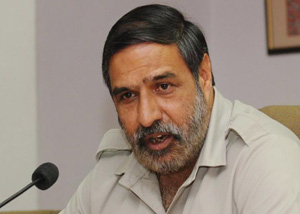New Delhi, Nov 26: The government today came under a blistering attack from the opposition in Rajya Sabha on the issue of black money, with Congress asking it to apologise before people for "selling lies" or else fulfil the poll promise made to them.
Initiating a discussion on black money, deputy leader of Congress Anand Sharma said that when the BJP leaders were in the opposition, they had "misled" the country by making tall promises of bringing back the black money stashed away abroad.
Sharma said Prime Minister Narendra Modi, during BJP's poll campaign, had claimed that black money was to the tune of Rs 85 lakh crore.
He said Modi had also said that black money stashed abroad is equal to five Union budgets and that it was enough to put Rs 15 lakh in the account of all Indian citizens.
The Congress leader said that after assuming office, there has been a change in stance of the Prime Minister and now the quantum of black money is no longer known.
"Today, November 26, 2014, exactly six months after the government has taken over, there is a three sixty degree turn on the issue...Earlier everything was known, now nothing is known," Sharma said.
He claimed that leaders of the ruling party were "neither sincere nor serious" in their talk about black money earlier.
Taking a dig at BJP's election slogan, he said "achche din (good days)" have come and people are waiting for Rs 15 lakh to be put in their accounts as promised to them.
He said that then BJP chief Rajnath Singh, now the Union Home Minister, had said that if BJP is voted to power, black money would be brought back within hundred days.
Sharma claimed that the UPA government had done a lot of work on the issue of black money. "What additional information has the government got in the last six months apart from the information that the UPA was able to obtain," he asked.
He asked the government to act and fulfil the poll promises and if they cannot they should tell the people, "We sold lies but now we will try as a government."
Sharma also expressed concern over the way black money can be circulated and could be at play in various sectors like real estate.
He said that in the last few years the debate on black money had been very very loud, very political and this issue had been used as a tool to attack the earlier government.
He also referred to the agitation led by yoga guru Ramdev on the issue.BJP MP Vijay Goel said Congress was attacking the Modi government on the issue of black money when it had not done much itself.
He said those blaming NDA on the issue, refuse to understand that it has only been in power for six months and steps have been taken to fulfil promises made to the people.
Goel said that it was for Congress to answer questions as to how black money was stashed abroad when the party ruled at the Centre. He said that for three years, despite Supreme Court orders, the UPA had not constituted an SIT on black money.
By constituting SIT, the Modi government had given a message that it was serious on the issue, he said.
Ramgopal Yadav (SP) said black money is a serious issue and it is weakening the real economy.
He said the government had made promises to the people and people had believed what Narendra Modi had said.
Yadav said NDA is in power and now it is its duty to get back black money.He said the consequences of not fulfilling these promises would not be pleasant.
Derek O'Brien (TMC) accused the BJP of running a multi-billion dollar election campaign and also alleged that the current government has no intention to bring back black money.
He said domestic black money comes back into the real estate and stock market via tax havens in the form of Participatory Notes (PNs). The TMC leader demanded that PNs should not permitted.
Senior JD-U Sharad Yadav said the government cannot bring back money stashed in off-shore accounts and demanded that the government should concentrate on recovery of non-performing assets of banks and create employment.
Yadav also took a jibe at Prime Minister Narendra Modi saying he himself has admitted in his 'mann ke baat' (aired on All India Radio) that no-one knows the amount of black money.
A Navaneethakrishnan (AIADMK) said government was capable of bringing back the illicit funds.
BSP chief Mayawati said huge quantity of illegal funds have been stashed in off-shore accounts since Independence and various political parties which ruled at Centre are responsible for that.
She said the main promise of BJP during elections was that black money would be brought back and every Indian would get Rs 15-20 lakh in their accounts. She said UPA government was not serious on the black money issue and so is the present BJP-led NDA government.
Terming the PNs as biggest source of black money, Sitaram Yechury (CPI-M) demanded ban on them. He said government should revisit most of the DTAAs.
Another way to deal with black money issue, he said, was electoral reforms to check poll spending of political spendings.






Comments
Add new comment